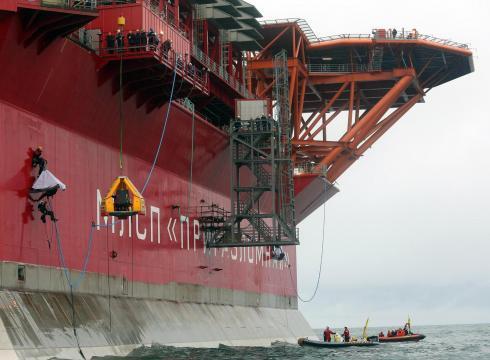
ASIA WOULD PAY RUSSIA

The crisis in Ukraine is relevant to Asia, both politically and in terms of energy security.
Politically, it illustrates the fact that economic interdependence may not prevent states taking decisive action if they feel that core national security interests are at stake in a dispute.
In terms of energy security, a collapse of the trade in natural gas between Russia and Europe - something that can no longer be ruled out - would have immediate and lasting repercussions on Asia's energy situation.
The crisis between Russia and "the West" over Ukraine has the potential to redefine the European security landscape, and even international relations beyond Europe. It could open a new chapter in the post-Cold War era.
Russia today resembles a classical European power of the pre-WWII era in the sense that Moscow believes in national sovereignty backed by military power. It wants a buffer between Russia and the ever-expanding "Euro- Atlantic" defence and economic organisations, which Moscow perceives as threats to both the internal and external dimensions of its national sovereignty.
Russia almost certainly has the power to achieve what it wants, at least to some degree. However, its actions in and towards Ukraine have triggered escalating economic sanctions by the United States and European Union, and these sanctions are starting to have a significant impact. There have been important capital outflows, precautionary freezing of projects and a scaling back of activity by multinational companies.
Ultimately, Western sanctions are testing what Russia is prepared to sacrifice economically in order to attain its foreign and security policy objectives.
It is a risky game to play, especially for Europe. Russia's response so far suggests that it is prepared to incur significant costs and even to add to them by retaliating through mutually costly measures.
In a tit-for-tat game of economic sanctions the ultimate stake is the EU-Russia gas trade, the largest bilateral commercial energy relationship in the world.
No official on either side has so far mentioned sanctions impacting directly the trade in natural gas. But the collapse of this 40-year energy relationship can no longer be ruled out. Russian gas supplies a quarter of the EU's needs and natural gas covers a quarter of total primary energy supply. Yet the ability to cope with a lasting disruption of Russian gas supplies would be very different from country to country. It would also be highly sensitive to timing, with late winter the most critical period.
A total disruption in summer would be benign in Western Europe, while a disruption in late winter could be economically disruptive for a number of member states in central and southeastern Europe, as well as Germany and Italy. An import or export ban might be total or partial, sudden or gradual, making precise assessments impossible. Yet it would necessarily amount to a severe energy security crisis at a time when Europe battles with the threat of deflation.
Inflicting such pain on Europe, however, would cost Russia dearly. In 2013, Gazprom - the Russian gas export monopoly - earned about US$45 billion (Bt1.44 trillion) a year from its sales to EU member states.
Europe is the most profitable of Gazprom's markets, generating nearly 60 per cent of revenues from 38 per cent of sales.
The tax losses to the Russian treasury would be significant.
While Russia's long-term response would be to shift Gazprom's focus even more decisively to Asian energy markets - already a key objective - the immediate consequence would be a big and lasting spike in European natural gas prices.
The closure of Japanese nuclear reactors after the Fukushima accident, which re-directed spot liquefied natural gas (LNG) cargoes away from Europe, was worth 60 million tonnes of oil equivalent.
But the gas trade between Russia and EU member states is twice as big. Cut-off from Russia, even if only partially, Europe would become desperate for LNG. Market arbitrage would bring Asian spot prices higher immediately, and European demand would increase the longer-term competition for LNG supply.
Asian expectations of a forthcoming fall in natural gas import prices would be disappointed. There would also be important energy policy implications. The hope of seeing gas play a more important role in the region's energy mix would be frustrated.
The return of Japan to nuclear power would be accelerated. Declining gas production in Southeast Asia would be replaced mainly by coal, increasing carbon dioxide emissions.
The Ukraine crisis could also alter Asian governments' perception of the political risks attached to large-scale gas imports from Russia.
naturalgaseurope.com





